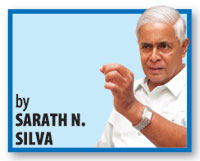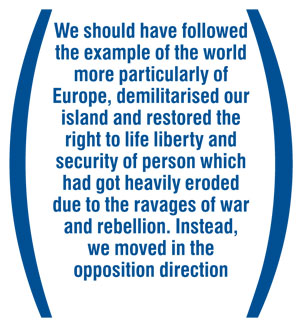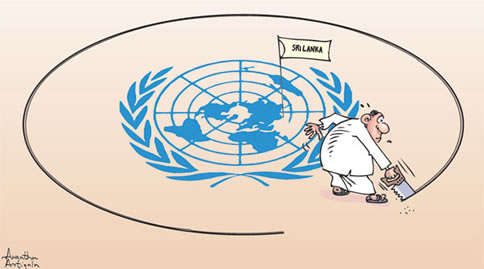Tragedy of the Sri Lankan State
Erosion of the Right to Life, Liberty and Security of Person
by Sarath N. Silva, Daily Mirror, Colombo, June 2, 2012
|
We should have followed the example of the world more particularly of Europe [after WWII], demilitarised our island and restored the right to life liberty and security of person which had got heavily eroded due to the ravages of war and rebellion. Instead, we moved in the opposition direction. We increased our military expenditure which is now the highest in the region as a percentage of GDP and started fighting a phantom war. |
Silva was Chief Justice of Sri Lanka's Supreme Court from 1999 - June 5, 2009.
Article 3 of the Universal Declaration of Human Rights adopted and proclaimed by the General Assembly of the United Nations on December 10, 1948 states that;
 “Everyone has the right to life, liberty and security of person”. This is the basic human right from which the other rights contained in the two Covenants of the United Nations which entered into force in 1976 are derived. The Government of Sri Lanka acceded to the two Covenants on 27 May 1980. The chosen day of accession was significantly the Wesak Day of the year, Thus the Government of Sri Lanka has undertaken an international obligation to respect and to ensure to all individuals within the country the rights recognised in the Universal Declaration and the Covenants. “Everyone has the right to life, liberty and security of person”. This is the basic human right from which the other rights contained in the two Covenants of the United Nations which entered into force in 1976 are derived. The Government of Sri Lanka acceded to the two Covenants on 27 May 1980. The chosen day of accession was significantly the Wesak Day of the year, Thus the Government of Sri Lanka has undertaken an international obligation to respect and to ensure to all individuals within the country the rights recognised in the Universal Declaration and the Covenants.
The General Assembly established the Human Rights Council (UNHRC) based in Geneva to review the position within each member state; to ascertain the measures taken to give effect to the rights of the Covenant and the extent to which people within the country are ensured the benefit of such rights. Hence, queries raised in Geneva cannot be castigated as an “imperial intervention to our sovereignty” as some ill informed persons are wont to do. They flow directly from a solemn undertaking given to the international community by the Government of Sri Lanka on an auspicious Wesak day and should be viewed as a precept taken for due and faithful observance.
Considered from another perspective, the fundamental rights guaranteed to every person by our Constitution are derived from the human rights of the Universal Declaration and of the Covenants. According to the basic Article 3 of the Constitution, fundamental rights form part of the sovereignty of the people which is inalienable. Article 4 (d) of the Constitution requires all organs of government being the executive, the legislature and the judiciary to “respect secure and advance” the fundamental rights of the people. Thus, measures taken by the UNHRC to secure our fundamental rights in effect enhance the sovereignty of the Republic of Sri Lanka that is reposed in the people and not in any organ of government as mistakenly espoused by some who are blinded by notions of monarchic grandeur.
 The right to life encompasses: a right to a quality of life with an adequate standard of living; healthcare, education; the right to work and conditions of employment; the right to form a trade union; right to take part in cultural life and to enjoy the benefit of scientific progress. The right to life encompasses: a right to a quality of life with an adequate standard of living; healthcare, education; the right to work and conditions of employment; the right to form a trade union; right to take part in cultural life and to enjoy the benefit of scientific progress.
Liberty, is essentially an absence of restraint and includes: the right to think; form an opinion, the freedom of speech, expression and publication; the freedom of assembly and association; the freedom to practise a religion of your choice; the freedom of movement and of choosing a residence within Sri Lanka. Such liberty may be subject to restrictions lawfully imposed to secure the enjoyment of liberty by the society as a whole.
The right to security of person, safeguards everyone from arbitrary arrest and detention which may be done only according to the due process of law. Any punishment may be imposed only by a court of competent jurisdiction with the person affected being entitled to have the conviction and punishment reviewed by a higher tribunal.
The world which emerged from two devastating wars gave its first priority to the guarantee of human rights universally, as the best safeguard against the recurrence of war and “to promote social progress and better standards of life in larger freedom,” as stated in the preamble to the Declaration. The relative peace of the post war period and the phenomenal material progress achieved, established the wisdom of the measures taken. Europe which was the seat of both wars, adopted in 1950 its own Convention on Human Rights based on the Universal Declaration under the aegis of the Council of Europe, with a separate Court and an enforcement mechanism including a Commission which has functioned effectively to ensure a high compliance of human rights. This war torn region has been transformed to the most peaceful area with the highest standard of life.
We in Sri Lanka inherited from the British a system of Parliamentary democracy, a firm commitment to the Rule of Law and an independent judiciary and public service including the Police. Although there was no elaboration of fundamental rights in the Soulbury Constitution which was previous to the Universal Declaration, the commitment to the Rule of Law, the independent judiciary and public service including the police assured to everyone the right to life, liberty and security of person. We attained a high standard of life with education, healthcare and welfare measures, way ahead of that in the region. The Prime Minister of Singapore stated early in 1950s that he took Sri Lanka as an example to be emulated. Although short sighted political measures to suddenly transform Sinhala to be the official language brought about communal violence of 1959, that too was contained. This relative peace, harmony and progress was shattered by the insurrection of 1971. The Emergency Regulations brought into force in March 1971 which was suppressive of human rights continued in force for decades. The recurrence of southern violence in 1988 and the four Eelam wars resulted in an entrenchment of the Emergency Regulations and repressive legislation such as the Prevention of Terrorism Act. Any measures to safeguard the security of the State or more appropriately that of the political establishment were condoned and there was impunity in respect of any transgression. The right to life, liberty and security of person drifted to the far horizon.

Southern violence was brutally crushed leaving no vestige. It is a redeeming feature that the JVP which inspired the 1971 insurrection has taken the path of democratic politics. The LTTE was firmly defeated on the banks of the Nandikadal lagoon on 19 May 2009. Sri Lanka thus reached a watershed in its current history similar to the watershed reached by the world with the defeat of Hitler. We should have followed the example of the world more particularly of Europe, demilitarised our island and restored the right to life liberty and security of person which had got heavily eroded due to the ravages of war and rebellion. Instead, we moved in the opposition direction. We increased our military expenditure which is now the highest in the region as a percentage of GDP and started fighting a phantom war.
A few days prior to my retirement as Chief Justice, early in June 2009, I had occasion to visit the ‘Menik Farm’ where thousands of refugees from the Wanni were detained in conditions of abject squalor and suffering. Long queue of pregnant women wailing for medical attention left a lasting impression of sadness and I realised that we were on the wrong path and that the tragedy of the erosion of the right to life, liberty and security of person will remain. I sensed that there would be a backlash but never guessed that it would be from Geneva.
Sarath N. Silva – A Wolf In Sheep’s Clothing
Comments:
sam Where did this "wisdom" go when the same man said "yes" to everything MR was doing?
Lanka Muslim, UK Wisdom, very often, dawns late. When it dawns let us appreciate it.
Sinnan True knowledge dawns only when one has finished his nasty jobs......
mmahendran SRI LANKA IS NOT RESPECTING THE UNITED NATIONS ON ALL AFFAIRS
S Tissera Most mortems are usually done once the patient is dead, it therefore too late. It would have been better if these prophets did the right thing when they were in the saddle.
|
 Home
Home Archives
Archives “Everyone has the right to life, liberty and security of person”. This is the basic human right from which the other rights contained in the two Covenants of the United Nations which entered into force in 1976 are derived. The Government of Sri Lanka acceded to the two Covenants on 27 May 1980. The chosen day of accession was significantly the Wesak Day of the year, Thus the Government of Sri Lanka has undertaken an international obligation to respect and to ensure to all individuals within the country the rights recognised in the Universal Declaration and the Covenants.
“Everyone has the right to life, liberty and security of person”. This is the basic human right from which the other rights contained in the two Covenants of the United Nations which entered into force in 1976 are derived. The Government of Sri Lanka acceded to the two Covenants on 27 May 1980. The chosen day of accession was significantly the Wesak Day of the year, Thus the Government of Sri Lanka has undertaken an international obligation to respect and to ensure to all individuals within the country the rights recognised in the Universal Declaration and the Covenants. The right to life encompasses: a right to a quality of life with an adequate standard of living; healthcare, education; the right to work and conditions of employment; the right to form a trade union; right to take part in cultural life and to enjoy the benefit of scientific progress.
The right to life encompasses: a right to a quality of life with an adequate standard of living; healthcare, education; the right to work and conditions of employment; the right to form a trade union; right to take part in cultural life and to enjoy the benefit of scientific progress.